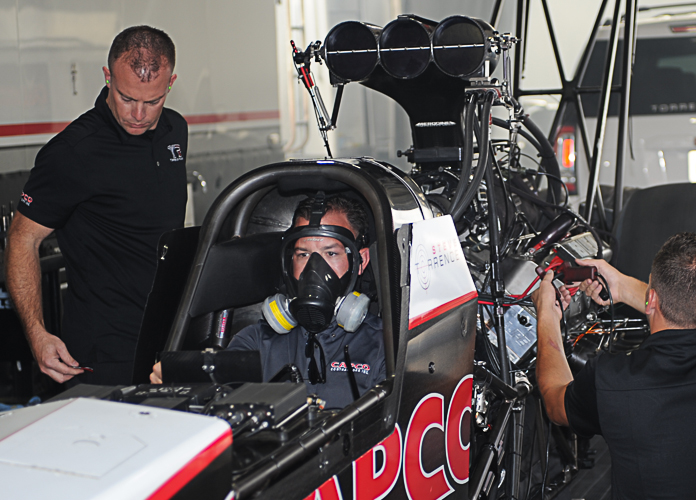TORRENCE’S HEART ATTACK PROVIDES A THIRD CHANCE AT LIFE

NHRA Steve Torrence figured his next brush with death would likely come with his 320-mph Top Fuel dragster.
Torrence, a cancer survivor, experienced a heart attack on June 22, 2016, which forced him to miss the NHRA Summit Racing Nationals in Norwalk, Ohio.
Little did Torrence know the after-effects of Hodgkin’s disease would come back to haunt him. Torrence's heart issue was caused by a blood clot, a byproduct of radiation treatment 15 years ago.
"My oncologist has been telling me for the last two or three years, 'You know, you're not going to get Hodgkin’s Lymphoma again. It's gone." Torrence said. "You're not going to get that. Now … we’re not worried about the cancer. Now we're worried about the effects of the treatment of cancer, and specifically what the radiation has damaged."
A routine trip to the gym and the monster reared its ugly head.
"For probably six or eight weeks before, I’d been having an aching pain in my left arm around my elbow, and down into my fingers," Torrence explained. "I didn't think anything about it. So, that day at the gym I just had my, my normal workout and didn’t really feel any different. Or anything."
Torrence was leaving the gym when the pain in his arm intensified like never before.
"I'd been blaming that on a pinched nerve or something," Torrence admitted. "If I moved my arm around and held it up in the air, it didn't hurt so bad. Driving a Top Fuel car, you get beat and banged around a little bit. You take a lot of things and blame it on that, so I didn’t really think anything of it."
Torrence began the drive home when the arm pain intensified and was joined by chest pain.
"I started sweating profusely, and got real sick to my stomach," Torrence said. "I wasn't even a half-mile from the gym when it got this bad. I was just going to go home and lay down. And when all that happened, I thought, 'you know, I might need to go to the hospital and get this checked out."
Torrence went to the local Emergency Room, where medical personnel began running tests, performing scans, and drawing blood.
"They couldn't really find anything. It happened again," Torrence said. "All the same symptoms happened again about an hour after I'd been there. So they ran more tests, another EKG, another CT scan, more bloodwork and everything came back negative, or nothing showed up."
Torrence said he experienced a tale of two nurses. One was ready to send him home while another was not keen on seeing him leave. Seven hours into his ordeal, doctors diagnosed Torrence with a heart attack.
 "When the cardiologists got there, we were 10-15 minutes from the time that I talked to them for the first time, they were rolling me into the operating room to put a catheter in my heart," said Torrence. "All the signs, all the symptoms, everything that was going on was a bad situation for me."
"When the cardiologists got there, we were 10-15 minutes from the time that I talked to them for the first time, they were rolling me into the operating room to put a catheter in my heart," said Torrence. "All the signs, all the symptoms, everything that was going on was a bad situation for me."
Torrence confirmed he was in surgery for 90 minutes.
Doctor confirmed the massive blood clot had taken up residence just outside of a major artery. The pain he experienced stemmed from the clot creating a blockage, and relief came when it broke loose. Torrence confirmed doctors told him his situation bordered on the worst kind of blockage, often referred to as a Widowmaker.
"Doctor looked at me and said, "you know, had that broken loose; you would've died. You would’ve been dead when you hit the floor."
Torrence understands the opportunity to cheat death is something a select few people ever receive.
"I had a pretty good understanding of the concept of death before," said Torrence. "When I had cancer, I knew I was sick, and you deal with it. You experience a long, drawn out process. And then going through this, you're only one heartbeat away from not being here.
"I was at the gym, and it is only a mile from the hospital. I was able to drive myself there and get treatment. The stars were aligned perfectly for me to be able to have that happen and get attention immediately, and recover from it. I could've been at a race track, I could've been in the car, I could've been in British Columbia or Mexico, or any of the places that I go that are miles and miles and miles from any type of health care facility. I mean, I could've been a million other places than the gym that was a mile away from the hospital."
Having a heart attack has changed Torrence and the way he approaches his daily life.
"It added another dimension to my perspective on life," Torrence admitted. "I was very thankful and very appreciative for having a second chance. But then when you, when you get it again, a third chance here. I think I'm far more fortunate and blessed than I should ever be. But it makes you think, 'Wow, what am I doing here?"
"I mean, you’re only one beat away from not being here anymore. I need to make sure I leave a better mark in every aspect of my life."





































